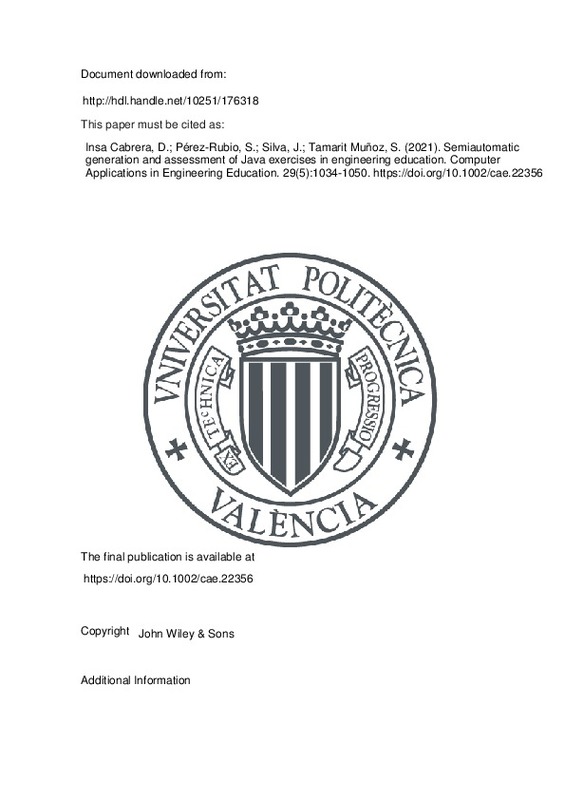JavaScript is disabled for your browser. Some features of this site may not work without it.
Buscar en RiuNet
Listar
Mi cuenta
Estadísticas
Ayuda RiuNet
Admin. UPV
Semiautomatic generation and assessment of Java exercises in engineering education
Mostrar el registro sencillo del ítem
Ficheros en el ítem
| dc.contributor.author | Insa Cabrera, David
|
es_ES |
| dc.contributor.author | Pérez-Rubio, Sergio
|
es_ES |
| dc.contributor.author | Silva, Josep
|
es_ES |
| dc.contributor.author | Tamarit Muñoz, Salvador
|
es_ES |
| dc.date.accessioned | 2021-11-05T14:08:09Z | |
| dc.date.available | 2021-11-05T14:08:09Z | |
| dc.date.issued | 2021-09 | es_ES |
| dc.identifier.issn | 1061-3773 | es_ES |
| dc.identifier.uri | http://hdl.handle.net/10251/176318 | |
| dc.description.abstract | [EN] Continuous assessment is essential in education. It should be an integral part of education that provides immediate feedback to students. Unfortunately, the assessment of programming source code is still a hand-operated and error-prone task, and can take weeks before the student gets feedback. This study presents a semiautomatic code assessment method able to automatically apply black-box assessment (which relies on the comparison of input-output pairs) and white-box assessment (which relies on checking different source code properties). The method proposed is a general-purpose assessment system that was originally designated to be used in engineering education, but that can be used in other educational contexts to assist the assessment of any Java programming assignments or exams. The main advantage of this system is that the assessment made is quicker, exhaustive, and objective; and it does not produce false positives. After the application of this method over two years in several real university courses, we have released a public and free implementation. An empirical evaluation of this system estimates that the amount of assessment work automatically done by the tool is over 48%. Additionally, the system has been used to measure the average subjective influence (i.e., assessment errors) introduced by teachers when they assess exams manually. | es_ES |
| dc.description.sponsorship | MINECO/AEI/FEDER (EU), Grant/Award Number: TIN2016-76843-C4-1-R; Universitat Politecnica de Valencia, Grant/Award Number: FPI Grant PAID-01-18; Generalitat Valenciana, Grant/Award Number: Prometeo/2019/098 (DeepTrust); TAILOR, EU Horizon 2020, Grant/Award Number: GA No 952215 | es_ES |
| dc.language | Inglés | es_ES |
| dc.publisher | John Wiley & Sons | es_ES |
| dc.relation.ispartof | Computer Applications in Engineering Education | es_ES |
| dc.rights | Reconocimiento - No comercial - Sin obra derivada (by-nc-nd) | es_ES |
| dc.subject | Assessment tools | es_ES |
| dc.subject | Automatic assessment | es_ES |
| dc.subject | Evaluation | es_ES |
| dc.subject | Java | es_ES |
| dc.subject | Marking | es_ES |
| dc.subject.classification | CIENCIAS DE LA COMPUTACION E INTELIGENCIA ARTIFICIAL | es_ES |
| dc.subject.classification | LENGUAJES Y SISTEMAS INFORMATICOS | es_ES |
| dc.subject.classification | QUIMICA ORGANICA | es_ES |
| dc.title | Semiautomatic generation and assessment of Java exercises in engineering education | es_ES |
| dc.type | Artículo | es_ES |
| dc.identifier.doi | 10.1002/cae.22356 | es_ES |
| dc.relation.projectID | info:eu-repo/grantAgreement/AEI/Plan Estatal de Investigación Científica y Técnica y de Innovación 2017-2020/PID2019-104735RB-C41/ES/SAFER-UPV: ANALISIS Y VALIDACION DE SOFTWARE Y RECURSOS WEB/ | es_ES |
| dc.relation.projectID | info:eu-repo/grantAgreement/UPV//PAID-01-18/ | es_ES |
| dc.relation.projectID | info:eu-repo/grantAgreement/EC/H2020/952215/EU/Foundations of Trustworthy AI - Integrating Reasoning, Learning and Optimization/ | es_ES |
| dc.relation.projectID | info:eu-repo/grantAgreement/AEI//TIN2016-76843-C4-1-R//METODOS RIGUROSOS PARA EL INTERNET DEL FUTURO/ | es_ES |
| dc.relation.projectID | info:eu-repo/grantAgreement/GVA//PROMETEO%2F2019%2F098//DEEPTRUST/ | es_ES |
| dc.rights.accessRights | Abierto | es_ES |
| dc.contributor.affiliation | Universitat Politècnica de València. Departamento de Sistemas Informáticos y Computación - Departament de Sistemes Informàtics i Computació | es_ES |
| dc.description.bibliographicCitation | Insa Cabrera, D.; Pérez-Rubio, S.; Silva, J.; Tamarit Muñoz, S. (2021). Semiautomatic generation and assessment of Java exercises in engineering education. Computer Applications in Engineering Education. 29(5):1034-1050. https://doi.org/10.1002/cae.22356 | es_ES |
| dc.description.accrualMethod | S | es_ES |
| dc.relation.publisherversion | https://doi.org/10.1002/cae.22356 | es_ES |
| dc.description.upvformatpinicio | 1034 | es_ES |
| dc.description.upvformatpfin | 1050 | es_ES |
| dc.type.version | info:eu-repo/semantics/publishedVersion | es_ES |
| dc.description.volume | 29 | es_ES |
| dc.description.issue | 5 | es_ES |
| dc.relation.pasarela | S\427215 | es_ES |
| dc.contributor.funder | European Commission | es_ES |
| dc.contributor.funder | GENERALITAT VALENCIANA | es_ES |
| dc.contributor.funder | AGENCIA ESTATAL DE INVESTIGACION | es_ES |
| dc.contributor.funder | Universitat Politècnica de València | es_ES |







![[Cerrado]](/themes/UPV/images/candado.png)

